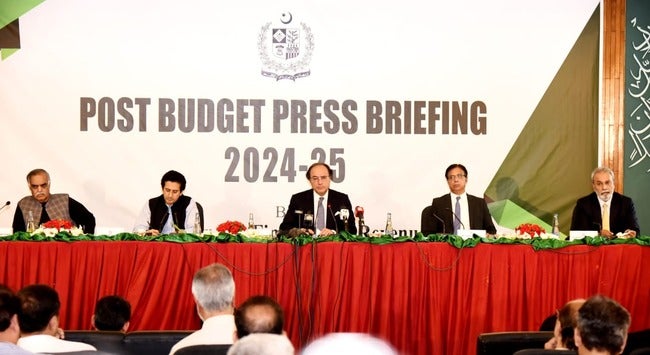Rs18.9 Trillion Budget Announced:
Pakistan’s Economic Dilemma
Imran Ahmed, Charukeshi Karikalan
12 July 2024Summary
On 28 June 2024, Pakistan’s Parliament passed an 18.9 trillion Rupees (S$91.3 billion) budget for the fiscal year 2024-25, setting a tax revenue target that is up an estimated 40 per cent from the preceding year. While seeking to strengthen housing and community amenities, social protection and, foremost, the economy, the budget has been met with sharp criticism from the opposition for imposing tax burden on citizens and pandering to the International Monetary Fund’s guidelines.
Pakistan finds itself in a dire economic predicament, driven by years of fiscal mismanagement, worsened by external crises, including the COVID-19 pandemic, a global energy shortage and devastating floods in 2022. The country is slated to make substantial external debt payments totalling US$25 billion (S$33.5 billion) in the upcoming fiscal year, a daunting task, given its dwindling foreign exchange reserves, which plummeted to just US$3 billion (S$4.03 billion) earlier this year. Despite recent stabilisation efforts, such as implementing austerity measures and eliminating energy subsidies to secure a crucial loan from the International Monetary Fund (IMF), Pakistan’s economic landscape remains concerning.
While there are signs of improvement, such as a reduction in inflation from its peak of 38 per cent in May 2023 and a marginal increase in reserves, economist Khaqan Najeeb cautions that the process of macro-stabilisation means Pakistan’s economic growth will stagnate at around two per cent per annum. Leading economists like Kaiser Bengali dub the current economic outlook a “mirage”, suggesting that perceived improvements remain fragile without comprehensive structural reforms. Moreover, political turmoil stemming from contentious elections marred by allegations of rigging and military involvement has complicated efforts to stabilise the economy and attract vital foreign investment. The recent assessment by Fitch Ratings has maintained Pakistan’s long-term foreign-currency issuer default rating at ‘CCC’, underscoring the precarious nature of the state’s financial stability amidst ongoing challenges.
Against this backdrop, the current government passed its 18.9 trillion Rupees (Rs) [S$5.56 billion] budget for the fiscal year 2024-25 with the tax revenue target set at an estimated Rs 13 trillion (S$62.84 billion), up by 40 per cent from the previous fiscal year. Finance Minister Muhammad Aurangzeb underscored that the budget aims to achieve sustainable economic growth by narrowing fiscal deficit, expanding government revenues and reducing unnecessary expenditures. He reiterated the administration’s commitment to engage with the Federal Board of Revenue in areas of revenue collection, digitisation and economic development.
The government granted exemptions for essential sectors like education, health and agricultural inputs, while concurrently pursuing economic reforms aligned with IMF’s recommendations. These measures were crucial to negotiations on a new IMF loan programme of US$6-8 billion (S$8-10 billion) said to stabilise its macroeconomic conditions and boost foreign reserves, crucial for sustaining economic stability and attracting investments.
However, opposition parties in Pakistan have vehemently opposed the newly passed budget, labelling it as highly inflationary and inadequate in addressing the country’s long-term structural issues. Criticism has been directed at the government’s reliance on increased taxation rather than implementing comprehensive reforms to broaden the tax base and stimulate real economic growth. Currently, only 5.2 million of Pakistan’s 240 million population are subjected to income tax. Economist Safiya Aftab noted that a reliance on quick-fix solutions to comply with the IMF’s demands like increased taxation disproportionately burdens the salaried class. This approach, as echoed by economist Ali Hasanain, not only fails to address broader systemic issues but also risks driving skilled professionals abroad due to unattractive economic conditions. Moreover, the persisting informal economy and corruption in the tax systems persist as significant revenue collection challenges. Pakistan has yet to bring its informal economy which is an estimated 64 per cent greater than its formal economy into the documented economy and only Rs38 out of Rs100 collected as taxes reach the government.
Opposition leader Omar Ayub, along with other political figures, criticised the government for excluding important stakeholders during the budget formulation process, highlighting concerns about transparency and inclusivity. Former Pakistan Muslim League (Nawaz) leaders, Shahid Khaqan Abbasi and Miftah Ismail, also criticised the budget for burdening the salaried class with increased taxes and allocating substantial funds to development schemes without a clear reform agenda that encompasses widening the tax base. Information Minister Attaullah Tarar, however, countered that a reform agenda is currently in the works.
Pakistan’s reliance on the IMF bailout packages continues to raise concerns about long-term economic sustainability and autonomy. Since gaining independence in 1947, Pakistan has received 23 IMF bailout packages, reflecting a historical trend of dependence exacerbated by political instability, financial mismanagement, and corruption. The over-dependence is particularly worrying as Washington’s support is integral to a successful negotiation with the IMF, yet the United States has recently expressed concerns over Pakistan’s internal affairs. Even with the successful approval of a new package, the success of Pakistan’s budget will ultimately hinge upon its capacity to address enduring challenges. With over 40 per cent of its population living below the poverty line, social unrest and political turmoil, however, remain a concern once the tax burden settles in.
. . . . .
Dr Imran Ahmed is a Research Fellow at the Institute of South Asian Studies (ISAS), an autonomous research institute at the National University of Singapore (NUS). He can be contacted at iahmed@nus.edu.sg. Ms Charukeshi Karikalan is a Research Intern at the same institute. She can be contacted at isav32@partner.nus.edu.sg. The authors bear full responsibility for the facts cited and opinions expressed in this paper.
Pic Credit: Ministry of Finance, Government of Pakistan (@Financegovpk) / X (twitter.com)
-
 More From :
More From :
-
 Tags :
Tags :
-
 Download PDF
Download PDF



